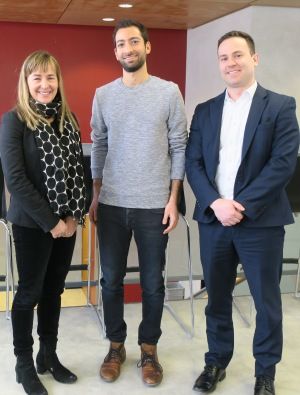
What does a corporate lawyer do? What is M&A? Does one need a commerce degree to thrive in business law? Samantha Horn, Law’91, Robert Khazam, Law’14, and Andrew Sapiano, Law’16, answered these and other questions from students interested in corporate law.
They returned to their alma mater as part of the second annual Law’80 “Careers in Business Law” series for this year’s exploration of the “Road to Transactional Law.”
“We wanted to provide students exposure to relevant and growing issues in business law,” explains Diane Wu, Law’19, an executive member of the Corporate Law Club. “Many students in our club are interested in transactional work and our panelists did a great job discussing how young lawyers can play a part.”
Horn, a partner at Stikeman Elliott in Toronto, focuses her practice on mergers and acquisitions and financing for private equity and venture capital. “What I love about corporate is that we are all working towards the same goal,” she told students. Sometimes she represents the buyer and other times the seller. When the deal goes through, both sides achieve their desired result.
Transactional lawyers and litigators both look out for their clients’ interests, just in different settings, the panel explained. Sapiano, an associate at Cunningham Swan in Kingston, highlighted the role transactional lawyers have as advocates. He and Khazam, an associate at Osler, Hoskin & Harcourt in Toronto, valued what they had learned in litigation rotations during their recent articles. Khazam explained that transactional lawyers also have to think about how drafted text would appear to a court and to their litigator colleagues.
The trio had practical advice for students hungry to learn about business law. Khazam gained experience working as a student caseworker in the Queen’s Business Law Clinic. Horn recommended that students consider courses in tax law, real estate, employment law, and securities transactions, given that M&A lawyers need some knowledge in many areas to properly advise their clients.
“We are thrilled they were able to make the time for our panel!” exclaims Wu. “We think the students were able to gain a lot of important insight from these practitioners.”
The Careers in Business Law series is made possible by a gift from the Class of Law’80. The student-run Corporate Law Club organized and promoted the event moderated by Professor Mohamed Khimji, the David Allgood Professor in Business Law.
By Alexander McPherson